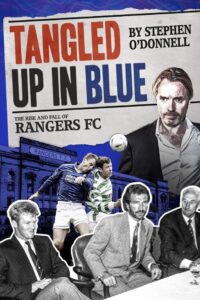 Some reviews are easier to do than others in that you know exactly how you feel about a book and therefore can easily articulate that. The more difficult ones are those where you are still, even a few days after finishing the book, unsure as to the impression left by the pages you have just digested.
Some reviews are easier to do than others in that you know exactly how you feel about a book and therefore can easily articulate that. The more difficult ones are those where you are still, even a few days after finishing the book, unsure as to the impression left by the pages you have just digested.
Therefore it is case of back to basics and seeing where it leads. The book itself is 245 pages long and divided into three parts, titled The Rangers End (consisting of five chapters), The Jungle (seven chapters) and The Celtic End (seven chapters). The majority of the book is narrated in the first-person (complete with Glaswegian accent) by the central character Kevin McGarry, with the story taking place in and around Scotland’s largest city. In addition there are chapters set in the Czech Republic and London where the reader is introduced to Peter Fitzpatrick and Patrick.
So far so good? Okay, then this is where the problems start in my looking to review and analyse the book. For instance, take the title, Paradise Road. ‘Paradise’ is an affectionate description of Celtic Park as used by the clubs fans. So is the title and therefore the book merely about the craic week-in, week-out watching The Hoops? Is it in fact a journey of discovery by Kevin of a new horizon or nirvana away from his life as a joiner in Glasgow and Scotland? Is it coincidental or homage by the writer that Paradise Road is also the title of a Czech film drama from the 1930s? Perhaps it is all or none of the above?
The pondering continues…why has O’Donnell divided the book into three parts and why the particular headings? Is it a vision of ground on ‘derby’ day with the respective Rangers and Celtic Ends? What is to be made of the title of Part Two, The Jungle, the term used for the old North terracing at Celtic Park. Are these literal references, or is there another meaning? Does for instance, The Rangers End, relate to the recent demise of the club from Ibrox? Is The Jungle a metaphor for the trials and tribulations of life as experienced by Kevin and his pals? Does The Celtic End relate to Kevin changing the way he supports the club and therefore the impact on his life going forward? Is this complete over-analysis on my part?
So breathe, clear the head.
Putting aside these questions, what is unavoidable as a reader is the clarity and range of themes that the book covers. Just taking football as a backdrop, O’Donnell explores the ritual of going to the match and the camaraderie (and bravado) it instils and how this has changed over the years; just as the game itself has with intrusive and sometimes meaningless 24/7 media coverage, foreign players, inflated wages, all-seater stadiums and the idea of clubs as brands. What we also get though is a glimpse of football in Glasgow in terms of the Rangers/Celtic rivalry and the sectarianism and bigotry associated with it. The author goes further in portraying what it is to be part of the Catholic community in the city, but how that identify (and indeed that of Celtic as a club) is a force that unites those wherever they find themselves in the world. Away from the football, O’Donnell focuses on the world of the working-class male, whether that be in Glasgow, London or Prague and their habits and attitudes as they ‘work, rest and play’.
So how does it leave me feeling? Well, it is essentially a good read and O’Donnell has created very believable and credible characters and situations. There is plenty of banter that football fans and lads on a night out will recognise, but there is also the serious side as Kevin McGarry attempts to make sense of the world around him in terms of his job, his family, his prospects and what might have been (through dream sequences) of his life as a Celtic player.
Returning to questions to be answered, the ending of the book is open to interpretation. Maybe this isn’t the end of the road just yet…
 If the wider, football-conscious world is aware of just two things about Scottish football, they are surely as follows: firstly, that there is a virulent rivalry in Glasgow between the city’s two great teams, Rangers and Celtic, based on a religious divide; and secondly, that Rangers recently suffered a catastrophic financial collapse, which ultimately led to the club’s insolvency.
If the wider, football-conscious world is aware of just two things about Scottish football, they are surely as follows: firstly, that there is a virulent rivalry in Glasgow between the city’s two great teams, Rangers and Celtic, based on a religious divide; and secondly, that Rangers recently suffered a catastrophic financial collapse, which ultimately led to the club’s insolvency. Some reviews are easier to do than others in that you know exactly how you feel about a book and therefore can easily articulate that. The more difficult ones are those where you are still, even a few days after finishing the book, unsure as to the impression left by the pages you have just digested.
Some reviews are easier to do than others in that you know exactly how you feel about a book and therefore can easily articulate that. The more difficult ones are those where you are still, even a few days after finishing the book, unsure as to the impression left by the pages you have just digested.